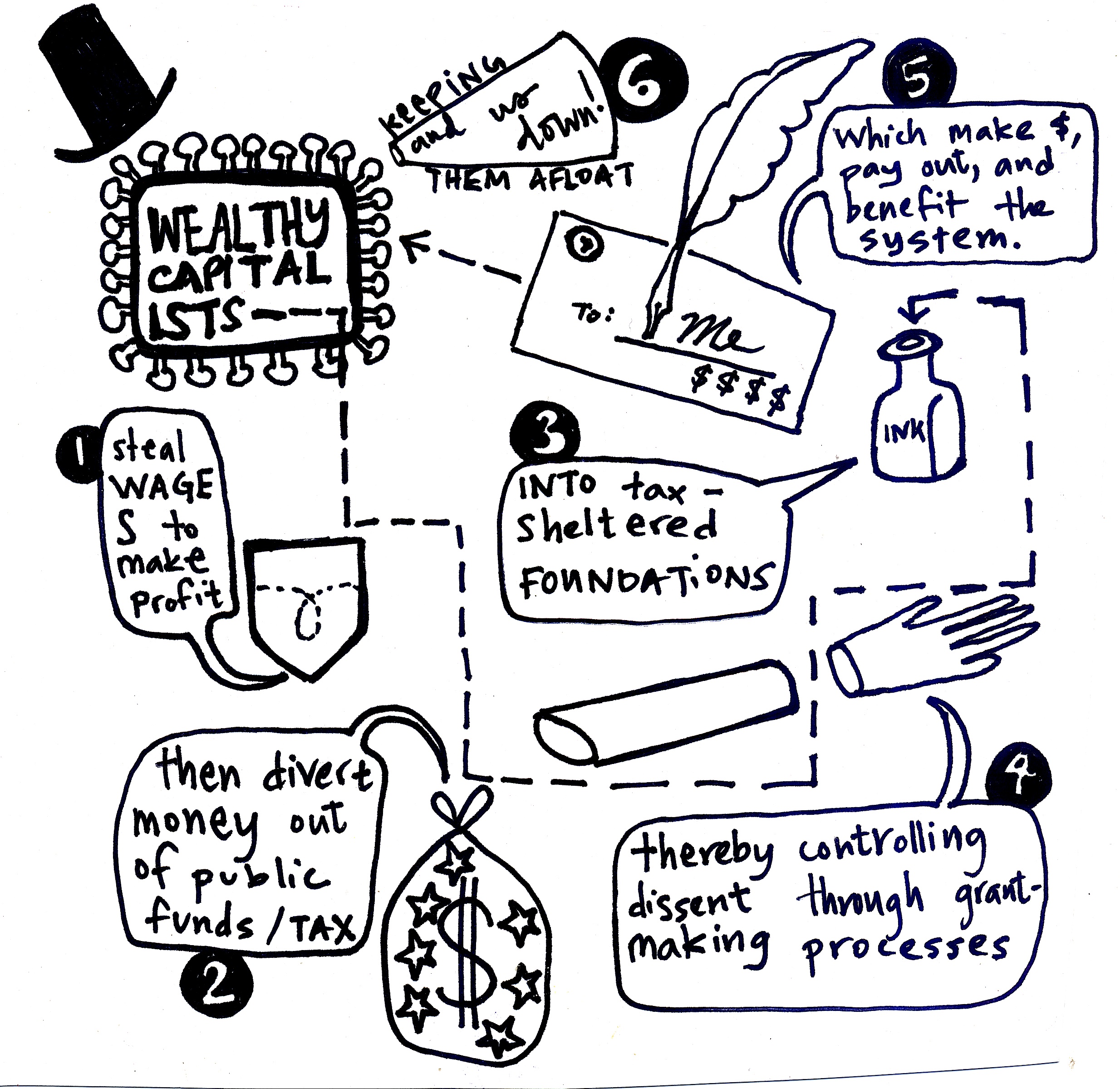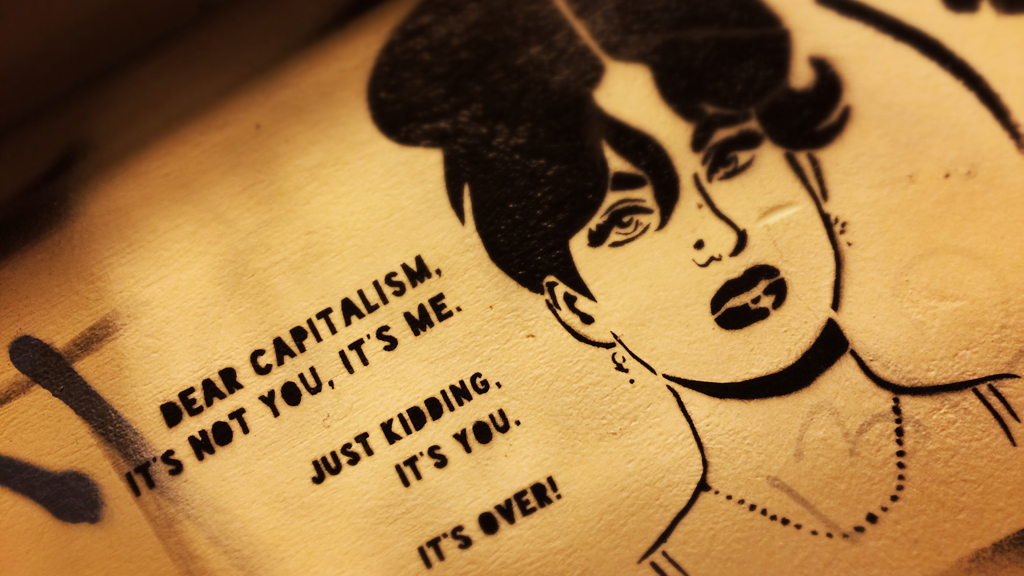Covert Capitalism and Western Benevolence
A current fad in social justice strategy is the concept of “effective altruism,” made popular in vegan circles by wealthy Princeton University professor and “father” of the Nonhuman Animal rights movement, Peter Singer. Singer is involved in a number of outreach efforts designed to rationalize charity, notably “The Life You Can Save” giving project. Effective altruists (who tend to be monied, Western whites) first choose what they believe to be the best and most effective charities in collaboration with nonprofit strategists, and then encourage others to rationally share their wealth by donating to them. By “taking the pledge” to donate a certain percentage of income to charity, those with the means to do so can supposedly alleviate the world’s woes.
This essay argues that, while important, aid is not the answer to injustice. This position is primarily based on the fact that aid has had a long sordid history in third world countries. Western elites usually only give aid to countries if there is an expectation of a return on their investment, such as creating a dependency on Western products, locking them under Western control with debt, and pressuring them to “free” their markets to Western capital. Some of the disastrous results have included forced sterilization projects, the spread of Western diseases of affluence, the infiltration of polluting and unsustainable industries, the destruction of traditional foodways, and a dependence on the West in general. In short, aid has been a project of Western imperialism.
Effective For Who?
The fundamental problem with the concept of effective altruism is that it is predicated on elite-designed algorithms and the preferences of capitalists. In other words, how problems are identified, defined, and solved is left up to the very class of persons who benefit from the problems. Inevitably, some of the most vulnerable groups will be overlooked. For instance, Singer’s choice charities are problematic in that none, as of this writing, target Nonhuman Animals. If rational impact maximization truly shapes effective altruism, this omission is suspect. Not only do Nonhuman Animals lead in number of individuals impacted, but their suffering is directly linked to the suffering of humans and the environment. Targeting the consumption of Nonhuman Animals (an activity that is especially linked to Western culture) would be the most utilitarian solution.
Singer does, however, support Project Healthy Children, a charity that pushes Western-approved foods on African children. This includes cows’ milk, even though most Africans are lactose intolerant, milk is directly linked to a litany of deadly human diseases, milk production is notoriously destructive to the environment, and milk causes immense suffering for the cows and goats forced to produce it (see Greta Gaard’s research).
Effective altruism also overlooks serious structural problems that impede equality. Instead of demanding justice and disrupting the exploitative practices of corporations and the elites that manage them, it solicits a modest redistribution from a sympathetic few. Consider that Big Pharma could easily relieve victims of malaria, HIV, tuberculosis, and other diseases ravaging the third world that effective altruists target. Instead, the Western-led pharmaceutical industry inflates the prices of the drugs to many times the actual cost in regions where disease congregates. It also heavily lobbies to protect “intellectual property” and prevent affordable generic alternatives from hitting the market. Introducing checks and balances into the structure of health and medicine could have monumentally positive impacts on the world’s poor, an impact that would far exceed the impact of donations.
Also suspect is Singer’s support for Population Services International, a charity designed to decrease the world’s population, or, more specifically, the population of third world countries. Anti-population groups are often responsible for forced and coerced sterilization projects on vulnerable women in poor regions of the world. Because poor people are a burden to the capitalist system, “population control” in third world regions has become a top priority of Western governments and aid projects. Millions of women have been psychologically devastated, socially ostracized, violated, hurt, maimed, and killed due to these policies.
Most fundamentally, it is important to recognize that these large populations of poor and vulnerable persons do not emerge from happenstance; they are products of an exploitative global economic system. What Singer’s project overlooks is that the underlying problem here is not a lack of funds, it is the capitalist system that originates social inequalities and chronic destitution. So long as this system remains in tact, there will always be need for charities and donations. And it will never be enough.
The NonProfit Industrial Complex
Lubricating this capitalist/charity system is the manifestation of the nonprofit regime. The nonprofitization of social change has positioned the state and the industries it serves in control over justice efforts, effectively nullifying radical liberatory politics. Notably, the public imagination for protest has been framed as deviant and replaced with the more rational, effective strategy of donating. This is decidedly a very pro-capitalist, neoliberal solution, but neoliberal capitalism has been identified as the root originator of inequality.

“Helping others” is just that: help, not structural change. Nonprofits, unfortunately, cannot prioritize radical restructuring because such an agenda is off-putting to the conservative foundations that issue their grant money (these foundations were created by wealthy elites who profit from the exploitation of the very oppressed persons nonprofits purport to help). Corporations and the state benefit from radical disempowerment, because radical claimsmaking is a threat to the capitalist agenda. It disrupts the status-quo that benefits the elite and naturalizes the suffering of the oppressed.
Instead, nonprofits are in the business of social services, doing the work that is made necessary by the capitalist exploitation that the state facilitates but does not “pay” for itself. Big industries become big by exploiting the poor and benefiting from state allocations. It becomes the responsibility of well-to-do altruists to relieve those damages when the state will not (or cannot). Of course, not everyone can afford to participate in this variation of social change work. As such, with the public convinced that financial participation is the only legitimate means of helping others, they become disempowered. Nonprofits find little use for the time, services, creativity, organizational skills, or leadership that public volunteers can offer. Primarily, they simply desire regular donations.
Furthermore, nonprofits are disproportionately staffed by wealthy, white educated men who invariably harbor privileged worldviews, and this will shape how they frame social problems and their solutions. By allocating charity work to nonprofits, the public forfeits control over social change to elites. This situation is likely to foster considerable bias.
Radicalize Your Giving
Donation is not completely useless, as some money does reach communities that can benefit considerably from it. However, for those who are determined to donate (and have the means to do so), it may be advisable to donate to grassroots efforts in areas of need. In doing so, money is placed directly into the hands of those who need it, not nonprofits that must accommodate the interests of elites.
Social change requires the collective effort of thousands, even millions of people. Not all will have the means to donate financially. When social change is reduced to a series of financial transactions, its tie to social change weakens, but its tie to capitalist expansion is emboldened. Capitalism is full of holes that are regularly plugged with charity and other bailouts. As such, effective altruism is actually rather irrational in sustaining an economic system that necessitates inequality.
An earlier version of this essay first appeared on the Academic Activist Vegan on December 20, 2013.
Readers can learn more about the capitalist politics of Nonhuman Animal rights movement in my 2016 publication, A Rational Approach to Animal Rights. Receive research updates straight to your inbox by subscribing to my newsletter.


